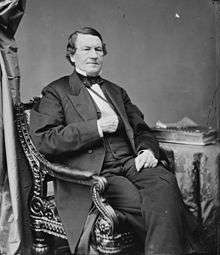John Covode
John Covode (March 17, 1808 – January 11, 1871) was a United States Congressman and abolitionist.
John Covode | |
|---|---|
 | |
| Member of the U.S. House of Representatives from Pennsylvania's 21st district | |
| In office February 9, 1870 – January 11, 1871 | |
| Preceded by | Vacant |
| Succeeded by | Henry D. Foster |
| Member of the U.S. House of Representatives from Pennsylvania's 21st district | |
| In office March 4, 1867 – March 3, 1869 | |
| Preceded by | John L. Dawson |
| Succeeded by | Vacant |
| Member of the U.S. House of Representatives from Pennsylvania's 19th district | |
| In office March 4, 1855 – March 3, 1863 | |
| Preceded by | Augustus Drum |
| Succeeded by | Glenni W. Scofield |
| Personal details | |
| Born | March 17, 1808 West Fairfield, Pennsylvania |
| Died | January 11, 1871 (aged 62) |
| Political party | Whig Republican (after 1854) |
Early life
Covode was born in Fairfield Township, Westmoreland County, Pennsylvania. He worked for several years on his father's farm, served an apprenticeship to a blacksmith, and then was employed at a woolen mill in Lockport, Pennsylvania. He became owner of the woolen mill, and attained considerable wealth as a woolen manufacturer.[1][2] Other business interests included the Westmoreland Coal Company, where he served as the first president of the company in 1854.[3] He served for two terms in the Pennsylvania Legislature[1] (House of Representatives[2]). Two attempts to enter the Pennsylvania Senate were unsuccessful.[2]
United States House of Representatives
In 1854, he was elected to Congress as an Opposition Party candidate.
After joining the Republican Party, he was re-elected to the 35th Congress in 1856. He was a strong supporter of the Freedmen's Bureau, the Civil Rights Act of 1866, and the Reconstruction Acts. He attended the Union National Convention in Philadelphia in 1866. On February 21, 1868, Covode introduced a resolution in the House of Representatives to impeach President Andrew Johnson.
Committees
He served as chairman of the United States House Committee on Public Expenditures from 1857 until 1859 and the United States House Committee on Public Buildings and Grounds from 1867 until 1869. He also served on the United States Congress Joint Committee on the Conduct of the War.
Covode Committee
Covode is most famous for chairing a committee to investigate the possibility of impeaching President James Buchanan during the spring and summer of 1860.
United States House election, 1870
Covode contested with Henry D. Foster the election to the Forty-first Congress, neither being sworn pending the contest, as no credentials were issued by the Governor. On February 9, 1870, the House declared him duly elected, whereupon he qualified and served until his death. Covode died in Harrisburg, Pennsylvania, aged 62.
Family
His oldest son, George H. Covode (1835–1864), was a colonel in the Union Army during the Civil War. He died on June 25, 1864 after being shot in the arm and stomach by Confederate troops he had mistaken for Unionists.
References
- . New International Encyclopedia. 1905.
- R. S. Cotterill (1930). "Covode, John". Dictionary of American Biography. New York: Charles Scribner's Sons.
- Westmoreland Coal Company Archived 2007-02-17 at the Wayback Machine
External links
- United States Congress. "John Covode (id: C000818)". Biographical Directory of the United States Congress.
- Biography from Spartacus Educational
- The Political Graveyard
- John Covode at Find a Grave
- Papers of John Covode - People's Contest Website
Bibliography
- Chester, Edward W. "The Impact of the Covode Congressional Investigation." Western Pennsylvania Historical Magazine 42 (December 1959): 343-50
- Baker, Jean H.: James Buchanan, Times Books: 2004
| U.S. House of Representatives | ||
|---|---|---|
| Preceded by Augustus Drum |
Member of the U.S. House of Representatives from Pennsylvania's 19th congressional district 1855–1863 |
Succeeded by Glenni W. Scofield |
| Preceded by John L. Dawson |
Member of the U.S. House of Representatives from Pennsylvania's 21st congressional district 1867–1871 |
Succeeded by Henry D. Foster |
